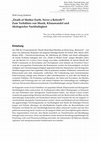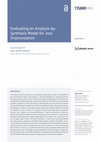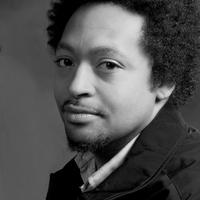Videos by Wolf-Georg Zaddach
Presentation about AI in popular music production and songwriting, in German.
9 views
Papers by Wolf-Georg Zaddach
IASPM Journal, 2023
The article discusses Artistic Research as a new paradigm. For this purpose, a contextualizing an... more The article discusses Artistic Research as a new paradigm. For this purpose, a contextualizing analysis on Practice Research is first conducted. Thereby, the essential points of criticism and potentials of Artistic Research are elaborated from the point of view of epistemic injustice and decolonizing approaches. Following on from this, Artistic Research is discussed as a promising approach to research and teaching in popular music. Topics and perspectives are suggested, and ultimately a call is made for collaborative research to develop a 'mosaic epistemology' and 'epistemological pluralism'.

Transformational POP: Transitions, Breaks, and Crises in Popular Music (Studies) (~Vibes – The IASPM D-A-CH Series 2), 2022
ENGLISH BELOW
Der Artikel diskutiert das Verhältnis von Musik, Klimawandel und ökologischer Nach... more ENGLISH BELOW
Der Artikel diskutiert das Verhältnis von Musik, Klimawandel und ökologischer Nachhaltigkeit. Dabei werden zunächst die gegenwärtigen Entwicklungen des Klimawandels und der Biodiversität mit Blick auf die Auswirkungen insbesondere auf Deutschland referiert und Ursachen für die nur langsam voranschreitende ökologische Transformation erörtert. Daran anschließend soll eine Diskussion des gegenwärtigen Forschungsstandes zu Nachhaltigkeit und Musik die bisherigen Entwicklungen und Defizite offenlegen. Im abschließenden Teil werden die Besonderheiten und Potentiale von Musik für eine Nachhaltigkeitswende näher untersucht und eine Perspektivenerweiterung durch Ansätze aus der jüngeren Ethik und Umweltphilosophie unternommen. Abschließend werden konkrete Handlungsempfehlungen skizziert.
----------------------
The article discusses the relationship between music, climate change, and ecological sustainability. First, the current developments of climate change and biodiversity with a particular view to the effects on Germany are reported and causes for a slow ecological transformation are discussed. This will be followed by a discussion of the current state of research on sustainability and music, which will reveal developments and deficits to date. In the final section, the special features and potentials of music for a sustainability transformation are examined in more detail and a broadening of perspectives is undertaken through approaches from recent ethics and environmental philosophy. Finally, concrete recommendations for action will be outlined.
Living Metal: Metal Scenes around the World, 2022

Transactions of the International Society for Music Information Retrieval, 2022
This paper pursues two goals. First, we present a generative model for (monophonic) jazz improvis... more This paper pursues two goals. First, we present a generative model for (monophonic) jazz improvisation whose main purpose is testing hypotheses on creative processes during jazz improvisation. It uses a hierarchical Markov model based on mid-level units and the Weimar Bebop Alphabet, with statistics taken from the Weimar Jazz Database. A further ingredient is chord-scale theory to select pitches. Second, as there are several issues with Turing-like evaluation processes for generative models of jazz improvisation, we decided to conduct an exploratory online study to gain further insight while testing our algorithm in the context of a variety of human generated solos by eminent masters, jazz students, and non-professionals in various performance renditions. Results show that jazz experts (64.4% accuracy) but not non-experts (41.7% accuracy) are able to distinguish the computer-generated solos amongst a set of real solos, but with a large margin of error. The type of rendition is crucial when assessing artificial jazz solos because expressive and performative aspects (timbre, articulation, microtiming and band-soloist interaction) seem to be equally if not more important than the syntactical (tone) content. Furthermore, the level of expertise of the solo performer does matter, as solos by non-professional humans were on average rated worse than the algorithmic ones. Accordingly, we found indications that assessments of origin of a solo are partly driven by aesthetic judgments. We propose three possible strategies to install a reliable evaluation process to mitigate some of the inherent problems.

In jazz studies and jazz theory, »modal jazz« is a well-established, but rather vague term. As ja... more In jazz studies and jazz theory, »modal jazz« is a well-established, but rather vague term. As jazz theorist Mark Levine puts it, »[m]odal tunes provide much more space for improvising on each chord compared to previous jazz tunes and standards […]. Because of this, it was natural for musicians to focus on the scale, or mode, of each chord, rather than on the chord itself.« 1 However, several authors emphasize that improvising on a certain scale or »mode« does not necessarily entail being restricted to the pitches of only that scale. For example, Barry Kernfeld writes that, »modal improvisation often unfolds in a flexible and unsystematic way that undermines the identity of specific ethnic or ecclesiastical modes […]«. 2 Although some of the church modes (Phrygian, Dorian etc.) are employed in modal jazz composition and improvisation, there does not appear to be any direct relation to medieval or non-Western practices of modality. However, there are links to African American music traditions, such as the blues, which are rooted in a non-functional harmonic organisation of sung melodic patterns accompanied by guitar or piano patterns. 3 Robert Hodson states that modal jazz could be better characterised as »a succession of static yet colourful blocks of music, and this stasis is a result of treating modes as collections of pitches in a way that relaxes the forward-moving tensions associated with goaloriented tonal music«. 4 Keith Waters sums up the discussion about modal improvisation in jazz research by indicating the different meanings of the term, ranging from improvisation over scales (instead of chords) and forms with a slow harmonic rhythm, often over pedal-points, to non-functional harmonic progressions in post-1960 jazz. 5 This broad usage of »mode« and »modal« in contemporary jazz, however, tends to dilute the original meaning of these terms. In music theory and ethnomusicology, the terms are applied to »open-ended heterogeneous networks of melodic types« on the one hand, and to »closed systems of music-theoretical categories« on the other. 6 As Lewis Porter points out, jazz theorists and jazz musicians generally use »mode« in this second, »closed-system« sense and define modes as types of scales. 7 »By the mid-18th century«, Powers writes, »›mode‹ in European languages meant a collection of degrees of a scale (and its aggregate intervallic content) being governed by a single chief degree: a mode was a scale with a tonic, which was the last note of a melody or the root of a final triad. This is the sense in which the major and minor scales, as well as the so-called 1

When In 1987 a cultural functionary of the "Central Working Group on Dance Music" descr... more When In 1987 a cultural functionary of the "Central Working Group on Dance Music" described heavy metal as the "current magic formula in popu- lar music" of the 1980s socialist East Germany, the German Democratic Re- public (GDR), it may be surprising that cultural politics is at all concerned with this musical phenomenon. The official further stated that heavy metal is a "legitimate part of the socialist music culture". This positive attitude to- wards metal is in general rather surprising in the 1980s, since the debate about heavy metal in Western countries was dominated by the so-called moral pan- ics (NACHWEIS). Unquestionably, in socialist East Germany heavy metal was a popular youth culture in the 1980s. At the same time, however, as an originally Western youth culture it was quite problematic. The quoted ex- pression therefore reflects a general change of heart in the second half of the 1980s and the attempt to accept and integrate the popular yo...

Empirical Musicology Review, 2016
The metaphor of storytelling is widespread among jazz performers and jazz researchers. However, l... more The metaphor of storytelling is widespread among jazz performers and jazz researchers. However, little is known about the precise meaning of this metaphor on an analytical level. The present paper attempts to shed light on the connected semantic field of the metaphor and relate it to its musical basis by investigating time courses of selected musical elements and features in monophonic jazz improvisations. Three explorative studies are carried out using transcriptions of 299 monophonic jazz solos from the Weimar Jazz Database. The first study inspects overall trends using fits of quadratic polynomials onto loudness and pitch curves. The second study does the same using selected features related to intensity, tension and variability over the course of phrases in the solos. The third study examines the distribution of the relative positions of various improvisational ideas in a subset of 116 solos. Results show that certain trends can be found, but not to a large extent. Significant t...

Musicae Scientiae, 2016
We present a novel approach to the analysis of jazz solos based on the categorisation and annotat... more We present a novel approach to the analysis of jazz solos based on the categorisation and annotation of musical units on a middle level between single notes and larger form parts. A guideline during development was the hypothesis that these midlevel units (MLU) correspond to the improvising musicians’ playing ideas and action plans. A system of categories was devised, comprising nine main categories ( line, lick, theme, quote, melody, rhythm, expressive, fragment, void), 19 subcategories, and 41 sub-subcategories as well as syntactical rules to encode motivic relationships between units. A set of 140 monophonic jazz solos from various jazz styles (traditional, swing, bebop, hardbop, cool jazz, postbop, free jazz) was annotated manually, resulting in 4939 units in total. The median number of midlevel units is 32 per solo and 13.75 per chorus. The average duration is 2.25 s ( SD = 1.57 s), in good agreement with the duration of the subjective present. Overall, the most common main cat...

IEEE/ACM Transactions on Audio, Speech, and Language Processing, 2017
Both the collection and analysis of large music repertoires constitute major challenges within mu... more Both the collection and analysis of large music repertoires constitute major challenges within musicological disciplines such as jazz research. Automatic methods of music analysis based on audio signal processing have the potential to assist researchers and to accelerate the transcription and analysis of music recordings significantly. In this paper, we propose a framework for analyzing improvised monophonic solos in multi-instrumental jazz recordings with special focus on reed and brass instruments. The analysis algorithms rely on prior score-information, which is taken from high quality manual solo transcriptions. Following an initial solo and accompaniment source separation, we propose algorithms for tone-wise extraction of fundamental frequency and intensity contours. Based on this fine-grained representation of recorded jazz solos, we perform several exploratory experiments motivated by questions relating to jazz research in order to analyze the use of expressive stylistic devices such as intonation, pitch modulation, and dynamics in jazz solos. The results show that a score-informed audio analysis of jazz recordings can provide valuable insights into the individual stylistic characteristics of jazz musicians.

Samples. Online-Publikationen der Gesellschaft für Popularmusikforschung/ German Society for Popular Music Studies e. V., 2021
The article discusses artistic research as a (relatively) new perspective for practice-based musi... more The article discusses artistic research as a (relatively) new perspective for practice-based music research in popular music studies. First, I describe its historical development and relevant debates, followed by a discussion of artistic research in the context of music. Furthermore, I reflect to what extent artistic research can be relevant for popular music studies.
I demonstrate that the debate in popular music studies goes back to the 1980s and was neglected for a long time, yet has recently received new attention. Assuming this, significant topics and perspectives for practice-based research in popular music are discussed. I argue that popular music studies can substantially benefit from a
connection to the broader discourse around artistic research. Finally, I plead for collaborative research between artistic and academic music research in the future.
Etnomüzikoloji Dergis 2/2018 [Journal of the Turkish Ethnomusicology Association], 2018
Jugendkultur in Stendal: 1950-1990: Szenen aus der DDR - Porträts und Reflexionen, hrsg. v. Günter Mey, Berlin: Hirnkost, 2018
Kulturpolitik in Ostmittel- und Südosteuropa (1945 bis 2015), hrsg. v. Steffen Höhne, 2020











Uploads
Videos by Wolf-Georg Zaddach
Papers by Wolf-Georg Zaddach
Der Artikel diskutiert das Verhältnis von Musik, Klimawandel und ökologischer Nachhaltigkeit. Dabei werden zunächst die gegenwärtigen Entwicklungen des Klimawandels und der Biodiversität mit Blick auf die Auswirkungen insbesondere auf Deutschland referiert und Ursachen für die nur langsam voranschreitende ökologische Transformation erörtert. Daran anschließend soll eine Diskussion des gegenwärtigen Forschungsstandes zu Nachhaltigkeit und Musik die bisherigen Entwicklungen und Defizite offenlegen. Im abschließenden Teil werden die Besonderheiten und Potentiale von Musik für eine Nachhaltigkeitswende näher untersucht und eine Perspektivenerweiterung durch Ansätze aus der jüngeren Ethik und Umweltphilosophie unternommen. Abschließend werden konkrete Handlungsempfehlungen skizziert.
----------------------
The article discusses the relationship between music, climate change, and ecological sustainability. First, the current developments of climate change and biodiversity with a particular view to the effects on Germany are reported and causes for a slow ecological transformation are discussed. This will be followed by a discussion of the current state of research on sustainability and music, which will reveal developments and deficits to date. In the final section, the special features and potentials of music for a sustainability transformation are examined in more detail and a broadening of perspectives is undertaken through approaches from recent ethics and environmental philosophy. Finally, concrete recommendations for action will be outlined.
I demonstrate that the debate in popular music studies goes back to the 1980s and was neglected for a long time, yet has recently received new attention. Assuming this, significant topics and perspectives for practice-based research in popular music are discussed. I argue that popular music studies can substantially benefit from a
connection to the broader discourse around artistic research. Finally, I plead for collaborative research between artistic and academic music research in the future.
Der Artikel diskutiert das Verhältnis von Musik, Klimawandel und ökologischer Nachhaltigkeit. Dabei werden zunächst die gegenwärtigen Entwicklungen des Klimawandels und der Biodiversität mit Blick auf die Auswirkungen insbesondere auf Deutschland referiert und Ursachen für die nur langsam voranschreitende ökologische Transformation erörtert. Daran anschließend soll eine Diskussion des gegenwärtigen Forschungsstandes zu Nachhaltigkeit und Musik die bisherigen Entwicklungen und Defizite offenlegen. Im abschließenden Teil werden die Besonderheiten und Potentiale von Musik für eine Nachhaltigkeitswende näher untersucht und eine Perspektivenerweiterung durch Ansätze aus der jüngeren Ethik und Umweltphilosophie unternommen. Abschließend werden konkrete Handlungsempfehlungen skizziert.
----------------------
The article discusses the relationship between music, climate change, and ecological sustainability. First, the current developments of climate change and biodiversity with a particular view to the effects on Germany are reported and causes for a slow ecological transformation are discussed. This will be followed by a discussion of the current state of research on sustainability and music, which will reveal developments and deficits to date. In the final section, the special features and potentials of music for a sustainability transformation are examined in more detail and a broadening of perspectives is undertaken through approaches from recent ethics and environmental philosophy. Finally, concrete recommendations for action will be outlined.
I demonstrate that the debate in popular music studies goes back to the 1980s and was neglected for a long time, yet has recently received new attention. Assuming this, significant topics and perspectives for practice-based research in popular music are discussed. I argue that popular music studies can substantially benefit from a
connection to the broader discourse around artistic research. Finally, I plead for collaborative research between artistic and academic music research in the future.
https://www.transcript-verlag.de/978-3-8376-4430-2/heavy-metal-in-der-ddr/